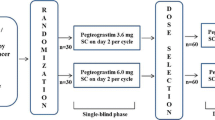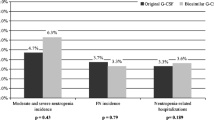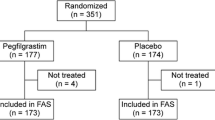Abstract
The primary use of recombinant granulocyte colony-stimulating factors has reduced the incidence of febrile neutropenia during dose-dense adjuvant/neoadjuvant chemotherapy programs for breast cancer. Otherwise, in this population, filgrastim seems to worse chemotherapy-induced anemia, especially when administered with prolonged schedules that induced leukocytosis. No exhaustive data are available about the effect of long-lasting formulation of filgrastim (pegfilgrastim) on hemoglobin levels. We retrospectively analyzed the data regarding hemoglobin level and leukocyte count of 38 breast cancer patients treated with dose-dense anthacycline and/or taxane-based chemotherapy with pegfilgrastim support, both in adjuvant and in neoadjuvant settings. Mean hemoglobin levels progressively decreased throughout the treatment (without correlation with both the schedule of chemotherapy and the patient’s age) but only two patients developed mild anemia. No significant correlation was found between the degree of leukocytosis and the hemoglobin decrease. These data suggest that pegfilgrastim, per se, doesn’t seem to worse chemotherapy-induced anemia. This fact may be at least in part explains by its “balanced” impact on hematopoietic recovery during dose-dense chemotherapy.


Similar content being viewed by others
References
Citron ML, Donald AB, Cirrincione C, Hudis C, Winer EP, Gradishar WJ et al (2003) Randomized trial of dose-dense versus conventionally scheduled and sequential versus concurrent combination chemotherapy as postoperative adjuvant treatment of node-positive primary breast cancer: first report of Intergroup trial C9741/Cancer and Leukemia Group B Trial 9741. J Clin Oncol 21(8):1431–1439
Kuderer NM, Dale DC, Crawford J, Lyman GH (2007) Impact of primary prophylaxis with granulocyte colony-stimulating factor on febrile neutropenia and mortality in adult cancer patients receiving chemotherapy: a systematic review. J Clin Oncol 25(21):3158–3167
Papaldo P, Lopez M, Marolla P, Cortesi E, Antimi M, Terzoli E et al (2005) The impact of five prophylactic filgrastim schedules on hematologic toxicity in early breast cancer patients treated with epirubicin and cyclophosphamide. J Clin Oncol 23:6908–6918
Papaldo P, Ferretti G, Di Cosimo S, Giannarelli D, Marolla P, Lopez M et al (2006) Does granulocyte colony-stimulating factor worsen anemia in early breast cancer patients treated with epirubicin and cyclophosphamide? J Clin Oncol 24(19):3048–3055
Schippinger W, Holub R, Dandachi N, Bauernhofer T, Samonigg H (2006) Frequency of febrile neutropenia in breast cancer patients receiving epirubicin and docetaxel/paclitaxel with colony-stimulating growth factors: a comparison of filgrastim or lenograstim with pegfilgrastim. Oncology 70:290–293
Von Minckwitz G, Kummel S, du Bois A, Eiermann W, Eidtmann H, Gerber B et al (2008) Pegfilgrastim ± ciprofloxacin for primary prophylaxis with TAC (docetaxel/doxorubicin/cyclophosphamide) chemotherapy for breast cancer. Results from GEPARTRIO study. Ann Oncol 19:292–298
Dang C, Fornier M, Sugarman S, Troso-Sandoval T, Lake D, D’Andrea G et al (2008) The safety of dose-dense doxirubicin and cyclophosphamide followed by paclitaxel with trastuzumab in HER-2/neu overexpressed/amplified breast cancer. J Clin Oncol 26(9):1216–1222
Burstein HJ, Parker LM, Keshaviah A, Doherty J, Partridge AH, Schapira L et al (2005) Efficacy of pegfilgrastim and darbepoietin-α as hemopoietic support for dose-dense every-2-week adjuvant breast cancer chemotherapy. J Clin Oncol 23:8340–8347
De Hann G, Loeffler M, Nijhof W (1999) Long-term recombinant human granulocyte colony-stimulating factor treatment severely depresses murine marrow erythropoiesis without causing anaemia. Exp Hematol 20:600–604
Wolff AC, Jones RJ, Davidson NE, Jeter SC, Stearns V (2006) Myeloid toxicity in breast cancer patients receiving adjuvant chemotherapy with pegfilgrastim support. J Clin Oncol 24:2392–2394
Danova M, Bencardino K, Manzoni M, Grasso D, Mariucci S, Rovati B (2007) In vivo biological effects of pegfilgrastim after myelosuppressive chemotherapy in breast cancer. Anticancer Res 27:3339–3402
Conflict of interest statement
The authors declare that they have no conflict of interest related to the publication of this manuscript.
Author information
Authors and Affiliations
Corresponding author
Rights and permissions
About this article
Cite this article
Manzoni, M., Delfanti, S., Rovati, B. et al. Chemotherapy-induced anemia in breast cancer patients treated with pegfilgrastim-supported dose-dense regimens. Clin Exp Med 10, 135–138 (2010). https://doi.org/10.1007/s10238-009-0072-y
Received:
Accepted:
Published:
Issue Date:
DOI: https://doi.org/10.1007/s10238-009-0072-y




